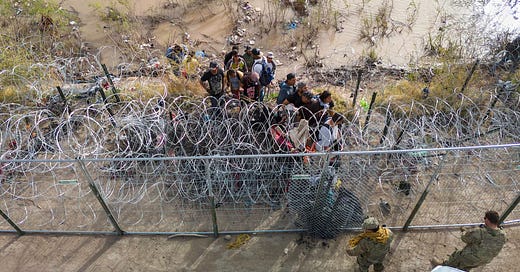Who's to guard the Mexican Border: USA or Texas?
All You Need to Know About Texas's Controversial Immigration Law, S.B. 4.
Texas's Controversial Immigration Law, S.B. 4
Texas is in the news again for a law that's causing quite a stir, not just locally but across the Nation, indeed across the globe. Senate Bill 4, or S.B. 4 for short, is a new piece of Texas legislation that's turning heads for how it plans to handle immigration enforcement. This law, however, is currently in a tug-of-war in the Courts, making headlines and raising eyebrows.
The Essence of S.B. 4
S.B. 4 is Texas's bold step to crack down on illegal border crossings. It labels sneaking into Texas from Mexico without the proper paperwork as a minor crime, possibly landing someone in jail for up to six months. If someone tries entering after being previously denied or deported, they're looking at a felony charge, with prison time ranging from 10 to 20 years.
One of the most controversial aspects of the law allows state judges to order deportations, with local police expected to enforce these orders. This move sidesteps the usual federal control over immigration, sparking a legal battle over whether a State can take such actions, which has traditionally been seen to be in the domain of the Federal Government.
The Legal Battle Heats Up
The law was temporarily put on hold by a federal appeals court, barely a day after the US Supreme Court declined to stay its operation, leaving it to the first court of appeal to take a call on the matter. This back-and-forth reflects the ongoing debate over the law's constitutionality and its broader implications on immigration policy.
Critics, including U.S. District Judge David A. Ezra, argue that the law likely oversteps constitutional bounds, especially since immigration surges do not equate to an "invasion" as the law suggests. However, the 5th Circuit Court allowed the law to proceed while the legal challenges play out, with the Appellate Court stepping in to say it can stay in effect for now, though not providing detailed reasoning for their decision.
Enforcement: A Complicated Affair
How S.B. 4 will be enforced is still somewhat unclear. It could lead to Texas arresting migrants before they're even encountered by U.S. Border Patrol, complicating the process of who handles these individuals. The Mexican government has already expressed its opposition, and law enforcement within Texas has shared concerns about the practicality and impact of enforcing the law.
Community Response and Concerns
Immigrant rights groups are up in arms, labeling S.B. 4 as one of the harshest immigration laws ever passed. They're rallying to educate Texas residents about their rights and preparing for legal battles. The fear is that this law doesn't just target migrants but could also impact any resident of color, increasing racial profiling and straining community-police relations.
Legal experts and advocates worry about the law's vagueness and the potential for it to infringe on civil liberties. There's a growing call for guidance on how exactly to implement S.B. 4 without causing undue harm to communities or violating federal laws.
In Summary
S.B. 4 is a controversial attempt by Texas to manage its border security, challenging long-established norms around immigration enforcement. As it stands, the law's future is tangled in legal proceedings, with significant implications for immigrants, residents of Texas, and the broader national debate on immigration policy. The ultimate outcome of this case will be crucial in not only shaping the enforcement of the immigration policy but also settle a jurisdictional dispute between the State of Texas and the United States of America, within the framework of the US Constitution.






The law perhaps ultimately will and should stand against Texas . Immigration is a federal system but completely broken and has been in the workshop for repairs for several decades. No political party has the nerve or will to touch this divisive issue. Neither party is respecting the reality.
1. It is a fact that there are over 10 million illegals which 3% of US populations in the country.
2. Majority of them ( Hispanics) have very strong work ethic , dependable and skilled hard workers. All restaurants , hotels and cleaning business will come to stand still overnight without them.
3. This reality must be accepted and they need to be given path to the citizenship. Work permits even if these are temporary should be provided. This will stop exploitation by employers and they will pay taxes .
4. There should be zero tolerance for illegals. They all should come through the front door like I did.
My $0.02